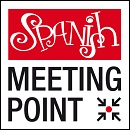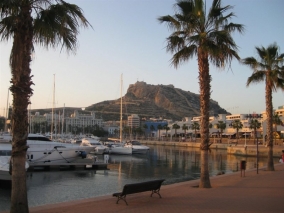Spanish schools and accommodation to study Spanish in Spain
Recent posts
Last schools
introduced
introduced
1 Accommodation

9 Spanish schools

Learning Spanish in Alicante. The tourist guide to study your Spanish course.
General Information. Alicante has a population of 340,000 and as many as 500,000 in its greater metropolitan area. It is located on the east coast of Spain, 400 kilometres to the south-east of Madrid. The second most important city in the Autonomous Community of Valencia, it has an outstanding choice of schools in which to study the Spanish language. Economic figures show that the province is ranked fourth behind Madrid, Barcelona and Valencia. It has a history that stretches back well over 3,000 years, with Iberian people inhabiting the region for many centuries BC. Its climate is warm and mild both in summer and winter and it enjoys extensive hours of sunlight. These facts, together with Alicante's numerous beaches and seafront promenades, have converted the city into an important tourist resort. An extensive and historic castle can be found atop a large hill and the city's old quarter stretches around this hill. The green and spacious university campus (1979) is home to around 33,000 students and is very successful in attracting applicants to Europe's Erasmus programme. There are two official languages, Spanish and Valencian, although the latter is rarely used. Alicante is a very attractive place to study Spanish with many language schools offering a wide range of courses.
Surrounding areas. Campello (12 kilometres), with its beaches and attractive promenade. Elche (20 kilometres) boasts El Palmeral (a palm tree plantation) and every year sees the performance of a religious play called "El Misteri"; both have been declared World Heritage Sites. Benidorm (45 kilometres) is also of interest to tourists with its numerous renowned beaches, similar to those found along the length and breadth of the Costa Blanca in the province of Alicante. Other places of interest include: Altea (55 kilometres), Guadalest (62 kilometres), the Canelobre Caves (26 kilometres), ‘the Route of the Castles of Vinalopó‘ (30 kilometres), Alcoy (55 kilometres), the Sierra Mariola (70 kilometres) and Orihuela (55 kilometres), a town which has been awarded ‘historical monument' status.
Main Sights. The Santa Bárbara castle is one of the largest fortresses in Spain, dating from the 9th century and Moorish in origin. The 18th century baroque Town Hall. The 14th century Basilica of St. Mary. The 16th century Cathedral of St. Nicholas of Bari. All are very close to La Explanada, the seafront promenade alongside the port. Tabarca, an island where Barbary pirates found refuge, is situated 12 kilometres off the coast of Alicante; its walls were declared a national Site of Historical and Artistic Merit and a Heritage of Cultural Interest and its waters are a Mediterranean marine reserve. Tossal de Manises, at La Albufereta beach, is an important archaeological site containing Iberian-Roman remains from the old city of ‘Lucentum', now Alicante. The Saint Faz monastery is a few kilometres from the city centre.
Culture. Museums worth visiting include the Provincial Archaeological Museum, the Museum of Contemporary Art, the Gravina Fine Arts Museum, the Alicante Bullfighting Museum (Museo Taurino de Alicante), the Pozos de Garrigós water museum, and the Museu de Fogueres de Alacant, which is devoted to the city's most important fiesta. There are many festivals such as the Contemporary Music Festival (second fortnight in September), the International Puppet Festival (end of November and beginning of December) or Alacant Rock (in July and August). The city also has two important theatres, Teatro Principal and Teatro Arniches, which serve as venues for performances and other cultural events.
Beaches. The beaches of the Costa Blanca, which span the whole province, are the area's greatest attraction. Alicante has several beaches: La Almadraba, La Albufereta, El Postiguet, Las Huertas, El Saladar and San Juan. The latter is the busiest due to its seafront promenade, ample range of bars, restaurants and beach bars and also because of its sports areas. Continuing on from this beach, you arrive at Campello, a coastal town within the metropolitan area, with beaches and its own traditional seafront promenade. The island of Tabarca has a beach of the same name and can be reached by boat trips that leave from either the port in Alicante or Santa Pola, a nearby coastal town. The beaches are a major attraction for the many students who decide to study Spanish in Alicante.
Shopping. The most important area for shopping is the Avenida Maissonave where you will find two big department stores belonging to the popular retail chain El Corte Inglés. Another commercial area can be found in the city centre between Calle Gerona and Calle del Teatro. Among several other shopping centres, it is worth highlighting Plaza Mar 2, which is very close to Postiguet beach.
Gastronomy. Most of the bars and restaurants in Alicante are to be found in the Port, El Barrio and the promenade of La Explanada and in the Panoramis entertainment complex next to the marina. The beach of San Juan also boasts a full range of bars and restaurants which are busier in the summer months. The typical dishes are: paellas and all kind of rice dishes like arroz a banda (rice cooked in fish stock) or caldero (a rice stew); tapas; montaditos (small bread rolls with a variety of fillings); fish and seafood such as red prawns and shrimps. And for dessert: dates, aniseed rolls, traditional almond nougat called turrón and home-made ice creams from the village of Jijona. The area enjoys the protection of the Alicante Designation of Origin label and there are many fine red and white wines.
Sports. You can play or learn almost any sport here. It is particularly worth mentioning water sports, golf and tennis, as you can take classes in all three. The port hosted the Cutty Sark Tall Ships' Race in 2002 and 2007. In 2008, Alicante was chosen as the starting point of the Volvo Ocean Race and is now the regatta's official venue. The most important football club is Hércules, currently in the Spanish first division. The city's basketball team, Meridiano Alicante, plays its matches in the ACB, the most important basketball league in Spain.
Fiestas. The Bonfires of San Juan, from 20th to 24th June, are popular celebrations where huge plaster of Paris monuments are set fire to. Numerous firework extravaganzas are organized during this fiesta, such as the mascletás and a firework contest on El Postiguet beach. These go on well into the following week and a great atmosphere can be found at any time of the day. The annual Carnival takes place in February.
Transport. Alicante's international airport is the fourth largest in the Spanish Peninsula in terms of number of air passengers (after Madrid, Barcelona and Málaga). The city has excellent transport links by train and road, with rail and coach lines to all parts of Spain. There is also a tram service that connects Alicante's city centre with the coastal towns and beaches; it passes through towns like Benidorm and Altea and goes as far as Denia. The city also has a tourist bus called ‘Turibús', which operates every day (except Mondays) from the end of March to December. It is easy to get from Alicante to other Spanish cities by train or by using the various coach services.
Nightlife. Students who decide to study Spanish in Alicante will discover a very active nightlife, thanks to the city's university atmosphere. The most popular areas for going out are: El Barrio, the old quarter, which is set on the hillside of the Santa Bárbara castle; the port area, with numerous dockside bars and discos; the ‘Route of Wood' (la Ruta de la Madera), a pub crawl around a series of live music venues in the city centre; the beach of San Juan with an extensive area of bars in Avenida Costa Blanca. Similar areas can be found around the Glorieta del Deportista Sergio Cardell and in the Alicante Golf zone.
Useful phone numbers.
Radio-Taxi...............: 965252511
Tele-Taxi..................: 965101611
Ayuda en carretera : 900123505
Bomberos................: 080
Cruz Roja.................: 902222292
Emergencias..........: 112
Policía Nacional......: 091
Renfe (trenes).........: 902240202
Turismo....................: 965200000
Entertainment Calendar.
Cinema
Concerts
Theatre and other shows
_________________________________________________________________
SHOPS AND ESTABLISHMENTS IN ALICANTE.
To advertise here visit this Link.
HAMBURGERS
McDonalds
Local and terrace Plazamar Mall 2, close to the Postiguet beach .
Opening hours: L-J 10:00-23:30 V-S 10:00-01:00 D 11:00-23:30
Avenida Denia, s/n ¤
03013 Alicante.
_________________________________________________________________
Surrounding areas. Campello (12 kilometres), with its beaches and attractive promenade. Elche (20 kilometres) boasts El Palmeral (a palm tree plantation) and every year sees the performance of a religious play called "El Misteri"; both have been declared World Heritage Sites. Benidorm (45 kilometres) is also of interest to tourists with its numerous renowned beaches, similar to those found along the length and breadth of the Costa Blanca in the province of Alicante. Other places of interest include: Altea (55 kilometres), Guadalest (62 kilometres), the Canelobre Caves (26 kilometres), ‘the Route of the Castles of Vinalopó‘ (30 kilometres), Alcoy (55 kilometres), the Sierra Mariola (70 kilometres) and Orihuela (55 kilometres), a town which has been awarded ‘historical monument' status.
Main Sights. The Santa Bárbara castle is one of the largest fortresses in Spain, dating from the 9th century and Moorish in origin. The 18th century baroque Town Hall. The 14th century Basilica of St. Mary. The 16th century Cathedral of St. Nicholas of Bari. All are very close to La Explanada, the seafront promenade alongside the port. Tabarca, an island where Barbary pirates found refuge, is situated 12 kilometres off the coast of Alicante; its walls were declared a national Site of Historical and Artistic Merit and a Heritage of Cultural Interest and its waters are a Mediterranean marine reserve. Tossal de Manises, at La Albufereta beach, is an important archaeological site containing Iberian-Roman remains from the old city of ‘Lucentum', now Alicante. The Saint Faz monastery is a few kilometres from the city centre.
Culture. Museums worth visiting include the Provincial Archaeological Museum, the Museum of Contemporary Art, the Gravina Fine Arts Museum, the Alicante Bullfighting Museum (Museo Taurino de Alicante), the Pozos de Garrigós water museum, and the Museu de Fogueres de Alacant, which is devoted to the city's most important fiesta. There are many festivals such as the Contemporary Music Festival (second fortnight in September), the International Puppet Festival (end of November and beginning of December) or Alacant Rock (in July and August). The city also has two important theatres, Teatro Principal and Teatro Arniches, which serve as venues for performances and other cultural events.
Beaches. The beaches of the Costa Blanca, which span the whole province, are the area's greatest attraction. Alicante has several beaches: La Almadraba, La Albufereta, El Postiguet, Las Huertas, El Saladar and San Juan. The latter is the busiest due to its seafront promenade, ample range of bars, restaurants and beach bars and also because of its sports areas. Continuing on from this beach, you arrive at Campello, a coastal town within the metropolitan area, with beaches and its own traditional seafront promenade. The island of Tabarca has a beach of the same name and can be reached by boat trips that leave from either the port in Alicante or Santa Pola, a nearby coastal town. The beaches are a major attraction for the many students who decide to study Spanish in Alicante.
Shopping. The most important area for shopping is the Avenida Maissonave where you will find two big department stores belonging to the popular retail chain El Corte Inglés. Another commercial area can be found in the city centre between Calle Gerona and Calle del Teatro. Among several other shopping centres, it is worth highlighting Plaza Mar 2, which is very close to Postiguet beach.
Gastronomy. Most of the bars and restaurants in Alicante are to be found in the Port, El Barrio and the promenade of La Explanada and in the Panoramis entertainment complex next to the marina. The beach of San Juan also boasts a full range of bars and restaurants which are busier in the summer months. The typical dishes are: paellas and all kind of rice dishes like arroz a banda (rice cooked in fish stock) or caldero (a rice stew); tapas; montaditos (small bread rolls with a variety of fillings); fish and seafood such as red prawns and shrimps. And for dessert: dates, aniseed rolls, traditional almond nougat called turrón and home-made ice creams from the village of Jijona. The area enjoys the protection of the Alicante Designation of Origin label and there are many fine red and white wines.
Sports. You can play or learn almost any sport here. It is particularly worth mentioning water sports, golf and tennis, as you can take classes in all three. The port hosted the Cutty Sark Tall Ships' Race in 2002 and 2007. In 2008, Alicante was chosen as the starting point of the Volvo Ocean Race and is now the regatta's official venue. The most important football club is Hércules, currently in the Spanish first division. The city's basketball team, Meridiano Alicante, plays its matches in the ACB, the most important basketball league in Spain.
Fiestas. The Bonfires of San Juan, from 20th to 24th June, are popular celebrations where huge plaster of Paris monuments are set fire to. Numerous firework extravaganzas are organized during this fiesta, such as the mascletás and a firework contest on El Postiguet beach. These go on well into the following week and a great atmosphere can be found at any time of the day. The annual Carnival takes place in February.
Transport. Alicante's international airport is the fourth largest in the Spanish Peninsula in terms of number of air passengers (after Madrid, Barcelona and Málaga). The city has excellent transport links by train and road, with rail and coach lines to all parts of Spain. There is also a tram service that connects Alicante's city centre with the coastal towns and beaches; it passes through towns like Benidorm and Altea and goes as far as Denia. The city also has a tourist bus called ‘Turibús', which operates every day (except Mondays) from the end of March to December. It is easy to get from Alicante to other Spanish cities by train or by using the various coach services.
Nightlife. Students who decide to study Spanish in Alicante will discover a very active nightlife, thanks to the city's university atmosphere. The most popular areas for going out are: El Barrio, the old quarter, which is set on the hillside of the Santa Bárbara castle; the port area, with numerous dockside bars and discos; the ‘Route of Wood' (la Ruta de la Madera), a pub crawl around a series of live music venues in the city centre; the beach of San Juan with an extensive area of bars in Avenida Costa Blanca. Similar areas can be found around the Glorieta del Deportista Sergio Cardell and in the Alicante Golf zone.
Useful phone numbers.
Radio-Taxi...............: 965252511
Tele-Taxi..................: 965101611
Ayuda en carretera : 900123505
Bomberos................: 080
Cruz Roja.................: 902222292
Emergencias..........: 112
Policía Nacional......: 091
Renfe (trenes).........: 902240202
Turismo....................: 965200000
Entertainment Calendar.
Cinema
Concerts
Theatre and other shows
_________________________________________________________________
SHOPS AND ESTABLISHMENTS IN ALICANTE.
To advertise here visit this Link.
HAMBURGERS
McDonalds
Local and terrace Plazamar Mall 2, close to the Postiguet beach .
Opening hours: L-J 10:00-23:30 V-S 10:00-01:00 D 11:00-23:30
Avenida Denia, s/n ¤
03013 Alicante.
_________________________________________________________________
© TEXT: SPANISH IN TOUR.
VIDEO: Patronato de Turismo de Alicante.
VIDEO: Patronato de Turismo de Alicante.
























